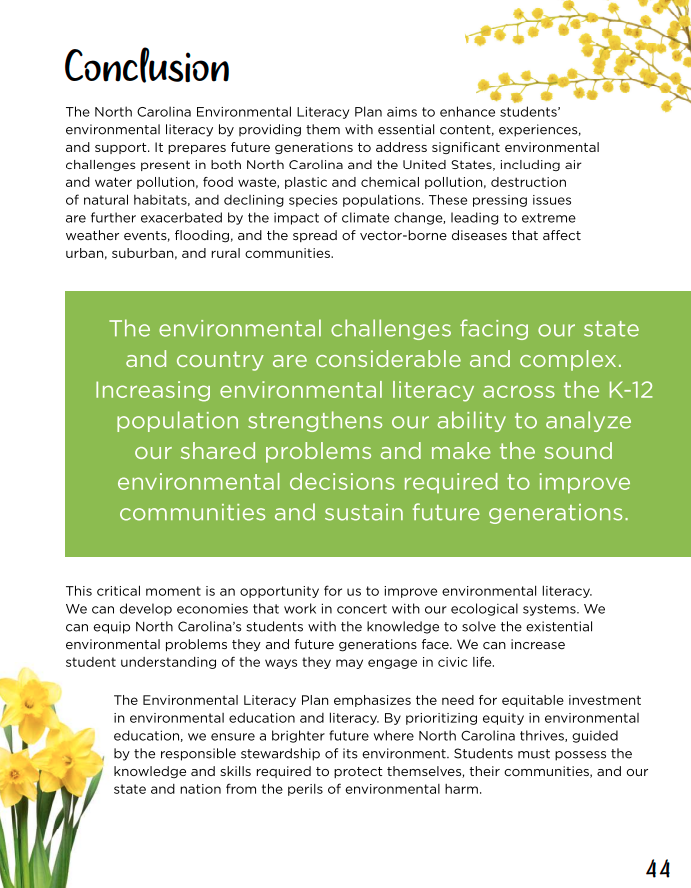DEQ’s new fearmongering ‘environmental literacy’ plan warns students of ‘existential’ threats
DEQ's new fearmongering 'environmental literacy' plan warns students of 'existential' threats Carolina Journal


Kindergarten through 12th-grade students to receive new environmental teachings in North Carolina schools
North Carolina schools will be implementing updated curriculum plans from the NC Department of Environmental Quality (DEQ) in conjunction with Earth Day, to provide new teachings on the environment for Kindergarten through 12th-grade students.
The Environmental Literacy Plan
The Environmental Literacy Plan, initially created in 2010, aims to promote a deeper understanding of environmental topics and equip students with the skills needed to participate in the environmental decision-making process. The plan offers guidance to schools and nonformal educators on increasing environmental literacy and preparing students for their futures. The plan can be accessed here.

DEQ Secretary Elizabeth S. Biser stated that the Environmental Literacy Plan serves as a roadmap for increasing environmental understanding and preparing students for STEM careers. The plan is exemplified by schools like Lincoln Heights, making it the perfect place to celebrate Earth Day and the release of the updated plan.
Collaboration and Goals
The curriculum update is supported by the Department of Public Instruction and the nonprofit Environmental Educators of North Carolina (EENC). It is designed to be integrated into existing coursework, rather than adding additional work for teachers. The goals of the curriculum update include:
- Strengthening environmental literacy to prepare students for future challenges and careers
- Increasing teacher knowledge of environmental education
- Expanding funding for environmental efforts
Emphasis on Sustainable Development Goals (SDGs)
The updated plan is intended to be a nonpartisan education program without advocating for specific environmental policy actions. However, it places significant emphasis on the Sustainable Development Goals (SDGs) and highlights the pressing issues of climate change, environmental justice, and equity in solving these problems.
The plan states, “To thrive and prosper, North Carolina’s students must gain the skills and knowledge to make informed, equitable, and effective decisions about environmental issues. We can equip North Carolina’s students with the knowledge to solve the existential environmental problems they face and future generations face.”
DEQ notes that the plan aligns with global sustainability goals, citing the United Nations’ 2030 Agenda for Sustainable Development.
The plan emphasizes the need for equitable investment in environmental education and literacy to ensure that environmental education in North Carolina is inclusive and accessible to all.
National Efforts
The initiative to enhance environmental literacy in schools is not limited to North Carolina. Maryland’s top officials have also called for environmental literacy to empower youth in the face of climate change. School districts in California, Florida, and Virginia have also been promoting recent efforts in this area.
Concerns about Student Proficiency
With only a third of students reading at grade level across the nation, student proficiency remains an ongoing concern. State Superintendent Catherine Truitt has prioritized student reading literacy through Operation Polaris 2.0.
During a Moms for Liberty event in Raleigh, speakers expressed concerns that literacy rates for reading and speaking could decline further in the coming years due to the lack of phonological processing skills acquired by young children during the COVID-19 emergency.
Susie Cole, an instructor with the National Institute of Learning & Development, stated, “That is really going to start showing up. Well, it already is showing up, actually. It’s going to start showing up with our literacy rates even more and more as we go on.”
SDGs, Targets, and Indicators
-
SDG 4: Quality Education
- Target 4.7: By 2030, ensure that all learners acquire the knowledge and skills needed to promote sustainable development, including, among others, through education for sustainable development and sustainable lifestyles.
- Indicator: Increased integration of environmental education into the curriculum and increased teacher knowledge of environmental education.
-
SDG 13: Climate Action
- Target 13.3: Improve education, awareness-raising, and human and institutional capacity on climate change mitigation, adaptation, impact reduction, and early warning.
- Indicator: Increased emphasis on climate change and environmental justice in the curriculum.
-
SDG 17: Partnerships for the Goals
- Target 17.16: Enhance the global partnership for sustainable development, complemented by multi-stakeholder partnerships that mobilize and share knowledge, expertise, technology, and financial resources.
- Indicator: Collaboration between the NC Department of Environmental Quality, the Department of Public Instruction, and the nonprofit Environmental Educators of North Carolina (EENC) to develop and implement the Environmental Literacy Plan.
Table: SDGs, Targets, and Indicators
| SDGs | Targets | Indicators |
|---|---|---|
| SDG 4: Quality Education | Target 4.7: By 2030, ensure that all learners acquire the knowledge and skills needed to promote sustainable development, including, among others, through education for sustainable development and sustainable lifestyles. | Increased integration of environmental education into the curriculum and increased teacher knowledge of environmental education. |
| SDG 13: Climate Action | Target 13.3: Improve education, awareness-raising, and human and institutional capacity on climate change mitigation, adaptation, impact reduction, and early warning. | Increased emphasis on climate change and environmental justice in the curriculum. |
| SDG 17: Partnerships for the Goals | Target 17.16: Enhance the global partnership for sustainable development, complemented by multi-stakeholder partnerships that mobilize and share knowledge, expertise, technology, and financial resources. | Collaboration between the NC Department of Environmental Quality, the Department of Public Instruction, and the nonprofit Environmental Educators of North Carolina (EENC) to develop and implement the Environmental Literacy Plan. |
Analysis
1. Which SDGs are addressed or connected to the issues highlighted in the article?
The issues highlighted in the article are connected to SDG 4: Quality Education, SDG 13: Climate Action, and SDG 17: Partnerships for the Goals.
2. What specific targets under those SDGs can be identified based on the article’s content?
Based on the article’s content, the specific targets identified are:
– Target 4.7: By 2030, ensure that all learners acquire the knowledge and skills needed to promote sustainable development, including, among others, through education for sustainable development and sustainable lifestyles.
– Target 13.3: Improve education, awareness-raising, and human and institutional capacity on climate change mitigation, adaptation, impact reduction, and early warning.
– Target 17.16: Enhance the global partnership for sustainable development, complemented by multi-stakeholder partnerships that mobilize and share knowledge, expertise, technology, and financial resources.
3. Are there any indicators mentioned or implied in the article that can be used to measure progress towards the identified targets?
Yes, there are indicators mentioned or implied in the article that can be used to measure progress towards the identified targets. These indicators include:
– Increased integration of environmental education into the curriculum and increased teacher knowledge of environmental education.
– Increased emphasis on climate change and environmental justice in the curriculum.
– Collaboration between the NC Department of Environmental Quality, the Department of Public Instruction, and the nonprofit Environmental Educators of North Carolina (EENC) to develop and implement the Environmental Literacy Plan.
These indicators can be used to measure progress towards achieving the targets under SDG 4, SDG 13, and SDG 17.
Overall, the article highlights the importance of environmental literacy in schools and the efforts being made in North Carolina to integrate environmental education into the curriculum. The updated Environmental Literacy Plan aligns with global sustainability goals and emphasizes the need for equitable investment in environmental education. The plan aims to prepare students for future challenges and careers, increase teacher knowledge of environmental education, and expand funding for environmental efforts. The collaboration between different organizations and the focus on climate change and environmental justice demonstrate a commitment to achieving the identified targets under the relevant SDGs.
Behold! This splendid article springs forth from the wellspring of knowledge, shaped by a wondrous proprietary AI technology that delved into a vast ocean of data, illuminating the path towards the Sustainable Development Goals. Remember that all rights are reserved by SDG Investors LLC, empowering us to champion progress together.
Source: carolinajournal.com

Join us, as fellow seekers of change, on a transformative journey at https://sdgtalks.ai/welcome, where you can become a member and actively contribute to shaping a brighter future.








